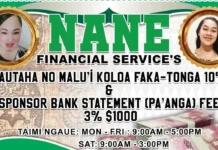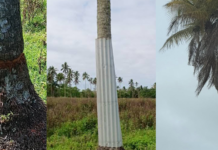COMMENT: The US authorities, who have been fighting against one of the most dangerous Tongan gangs in the world for years, could count on President Trump’s mass deportation policies to refocus their target on Tongan Crip Gang’s (TCG) influence and operations.

The new policies give Immigration and Customs Enforcement (ICE) officers and other law enforcement agencies more power and funding. This situation may lead to an increase in the number of deportees from the United States to the kingdom, thereby complicating the nation’s ability to manage the sophisticated criminal activities associated with returnees who have already been repatriated to the archipelago.
The US incoming President Donald Trump has vowed to launch “the largest deportation program in American history” immediately upon taking office.
The policies target an estimated 11 million undocumented migrants and asylum seekers in the US, including roughly 500,000 with criminal records. Trump pledged to use the military and federal agencies to conduct the move.
His new guidance would prioritize criminals but allow anyone without legal status to be picked up, giving more discretion to ICE officers, Reuters reported in November.
The plan also focuses on deportations of people with final orders of removal, and there was a plan to end birthright citizenship as part of the crackdown, Aljazeera reported.
Statistics
A recent report by the Lowe Institute indicates that 1,010 Tongans have returned after facing criminal issues overseas since 1998, with the majority of returns occurring since 2010. The primary source of these returns is the United States, although New Zealand and Australia are significant countries for deportations.
About 30 Tongan nationals were deported from the United States each year. Between 2004-2012 between 22 to 38 people were deported annually, according to the Department of Homeland Security’s Office of Immigration Statistics.
Most of the deportees are men and have usually done time for assault, robbery, burglary, theft and drug offences.
In 2018, the then Deputy Prime Minister Hon Hu’akavameiliku said about 400 Tongans had been deported from the United States of America, Australia and New Zealand.
A recent report by the Australian National University’s Department of Pacific Affairs says that “key problems around criminal deportations are a lack of support prior to deportation; poor information sharing; a lack of financial support for reintegration; and the diplomatic repercussions of deportation policies”.
The study by Henrietta McNeill says that “Most people deported to Samoa, Tonga and Cook Islands for criminal activity are males aged 25–35”.
Tongan Crip Gangs
While many deportees linked their activities abroad to specific gang affiliations, the Tongan Crip Gang (TCG) stood out markedly in the United States, which also has a link to New Zealand.
The TCG is a Tongan American street gang active in the U.S. states of California, Utah and Alaska. One report estimated it has over a hundred members who mainly belong to the Mormon church.
The TCG’s notoriety includes burglaries, auto theft, selling drugs, home invasions, credit card fraud, bank fraud, federal fraud (theft of federal documents, passports, driver’s licenses), witness intimidation, insurance fraud, arson, impersonation of both state police and federal agents.
It also included prostitution, hacking, kidnapping, extortion by means of threat to reveal information about the private life of an individual, crimes against the elderly, crimes against Central American Communities and individuals associated with the MS-13 (Mara Salvatrucha Gang), crimes against the disabled, mail fraud and murder.
In 2007, members of the Gang and the 18 Street Gang were indicted by a federal grand jury for criminal conspiracy in a plot to murder 33 members of a Los Angeles subset of MS-13.
Increasing crime activities
While some returnees regard their time in prison as a chance to re-think their lives and gain a different perspective, others have brought trouble to Tonga.
As Kaniva News reported previously, Tonga is in the midst of a methamphetamine crisis, and some deportees have gone back into the drug trade.
Former Prisons Commissioner Sione Falemanu previously said deportees have brought more crime to the kingdom and sparked a wave of robberies.
Research conducted by Tongan scholars in the United States has revealed that TCG significantly contributes to the entrenchment of gang life within the community, functioning as a angafakafonua, or a way of life. This concept embodies the integration of cultural identity and social behavior, suggesting that gang affiliation is not merely a choice but a lived experience deeply rooted in cultural practices and communal ties.
In her research on Tongan Crip Gang – A Tongan American Identity ‘Esiteli Hafoka found that a project known as the Salt Lake Area Gang Project (2017), aimed at attempting to resolve TCG criminal activities, garnered considerable attention from several key law enforcement and governmental agencies, including the United States Attorney’s Office, the United States Marshals Service, the Utah Department of Corrections, and the State Bureau of Investigation.
The agencies became increasingly concerned about the growing notoriety and influence of the TCG, recognizing the pressing need to address the complexities surrounding this gang and its implications for both the Tongan American community and public safety.
Hafoka also identified gang names and alliances in the Salt Lake area which affiliated with the TCG, such as Blood/Crip Gangs, Tongan Style Gang, Baby Regulators, and Rose Park Family under the “Tongan” heading.
Rehabilitation program
Several rehabilitation programs have recently been established in Tonga with the help of the Australian government to help with deportees.
This included the Foki ki ‘api (returning home), which involved some Tongans deported from the US to form Dare to Dream.
The group used their experiences of reintegrating into Tonga to help others in the same situation.







